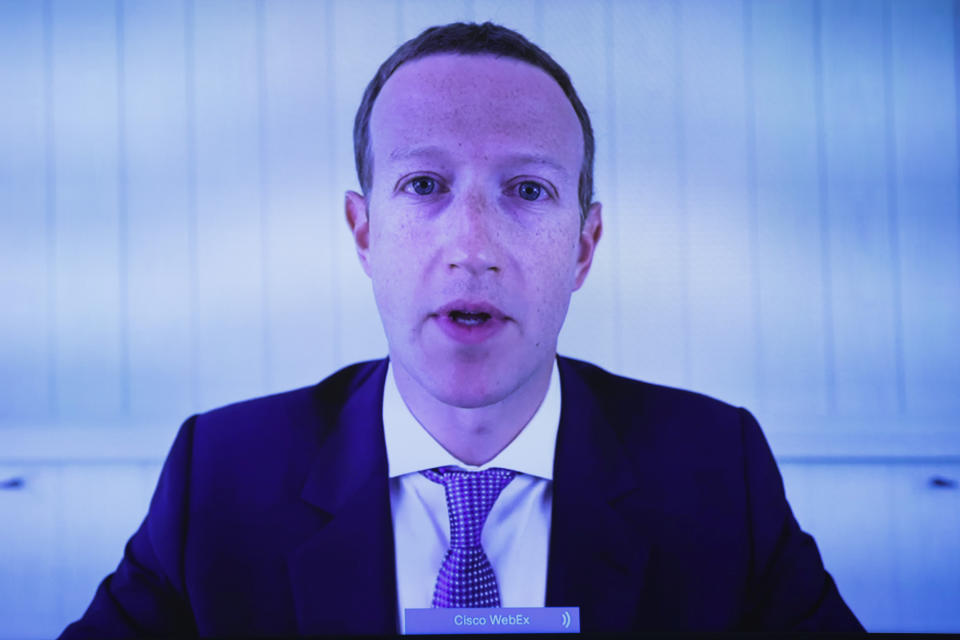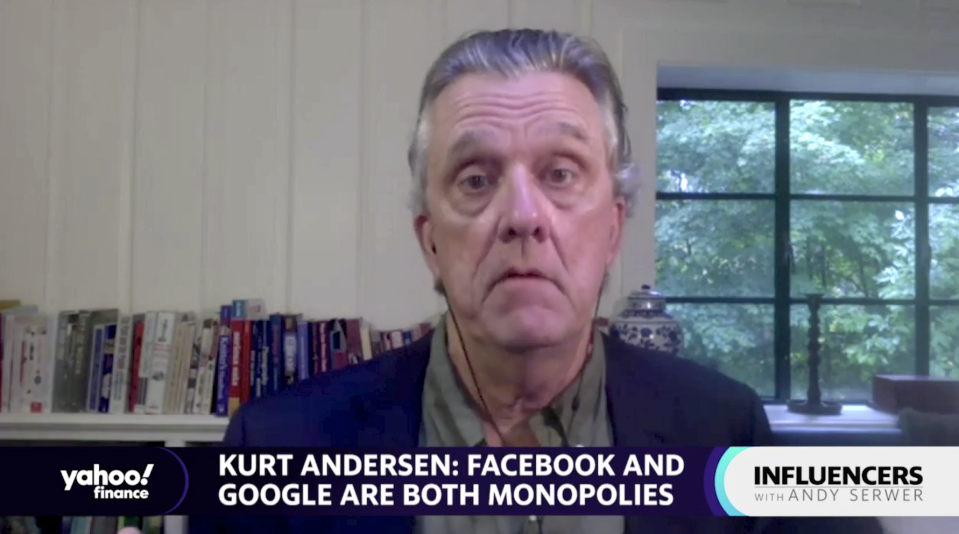Facebook a ‘net bad’ for society: Kurt Andersen
The push to break up tech giants Facebook (FB), Google (GOOG, GOOGL), Amazon (AMZN), and Apple (AAPL) took a major step forward on Tuesday, when a recommendation of that approach featured prominently in a 449-page report from Democratic members of a House subcommittee tasked with investigating the companies.
The report warned of monopoly power wielded by each of the firms, citing for instance the “firmly entrenched” dominance in social networking held by Facebook’s collection of apps and services.
In a new interview, left-leaning author Kurt Andersen called Facebook a “different beast” than other tech giants, arguing that its problems extend beyond market control. Andersen contends that Facebook’s immense platform is causing societal damage, and that CEO Mark Zuckerberg has failed to take any worthwhile steps to reduce it.

“You have the problems of monopoly, which is one set of problems,” said Andersen, who made the comments on Sept. 29, prior to the release of the House probe’s report.
“But then in the case of Facebook, you have a founder and CEO, who has made it clear, he is unwilling to make any meaningful attempts, really, to figure out how this new, incredibly powerful platform will not be worse for society and humanity than better,” he adds.
“It seems pretty clear to me that it's a net bad right now,” he says.
In response to the House subcommittee’s report, Facebook told Recode in a statement: “Facebook is an American success story. We compete with a wide variety of services with millions, even billions, of people using them. Acquisitions are part of every industry, and just one way we innovate new technologies to deliver more value to people.”
‘Twitter is making its efforts’
Facebook has faced elevated criticism in the run-up to the 2020 election. In May, Zuckerberg reiterated that Facebook wouldn’t interfere with inflammatory posts from President Donald Trump, prompting protests from employees. Some advertisers also boycotted Facebook over its refusal to stop hate speech, prompting Facebook to add labels to some posts.
More recently, the social networking giant has further acted to prevent the spread of misinformation, including by announcing that it would block new political ads in the final week of the race. On Tuesday, the company blocked a Trump post falsely stating that the coronavirus is less deadly than the flu. Twitter (TWTR) also blocked a similar post.
On the whole, Twitter has taken a more aggressive approach to addressing posts from Trump that violate its rules. Alerts attached to his posts have warned users about issues that range from misleading to manipulated content.

“Twitter is making its efforts,” Andersen says.
Andersen, the founder of “Spy” magazine who for two decades hosted a weekly public radio show called “Studio 360,” released a new book in August called “Evil Geniuses,” which examines how wealthy Americans leveraged their power to dictate federal policy in their favor from the 1960s onward.
Andersen spoke to Yahoo Finance Editor-in-Chief Andy Serwer in an episode of “Influencers with Andy Serwer,” a weekly interview series with leaders in business, politics, and entertainment.
Concerns about misinformation on Facebook reached a fever pitch after the 2016 presidential election, the outcome of which some have attributed to a Russian disinformation campaign on the platform. When revelations surfaced in 2018 that Cambridge Analytica, a consulting firm hired by the Trump campaign, had harvested the data of 50 million Facebook users, distrust of the company worsened.
In a wide-ranging interview with Yahoo Finance last December, top Facebook executives in charge of policing content said the platform’s election protections had evolved since 2016 but that moderation would never be perfect on a platform with billions of users.
‘I’m not saying it’s easy’
The task of addressing false or misleading posts on Facebook raises difficult questions, Andersen acknowledged.
“I'm not saying it's easy,” he says. “You don't want suddenly a government censor reading every post on Facebook.”
But he argued that Facebook’s unwillingness to accept accountability for and address content on its platform sets it apart.
“They forswear any responsibility for what is said or done on it,” he says. “That's a new situation.”
“There are technical means,” he adds. “Obviously they have pursued some of them at Facebook,” he adds.
“Their basic corporate instinct seems to be no, we're not going to do that,” he says. “Let a million flowers bloom — even if 643,000 of them are toxic opium poppies.”
Read more:
Ex-Obama official on the 'most troubling' difference between Ebola and COVID responses
David Chang: Restaurant failures could have ‘severe repercussions' for other businesses
Bill Gates: We should be able to ‘manufacture a lot of vaccines’ next year
Netflix co-founder on creative culture: We ‘manage on the edge of chaos’
Read the latest financial and business news from Yahoo Finance

 Yahoo Finance
Yahoo Finance 